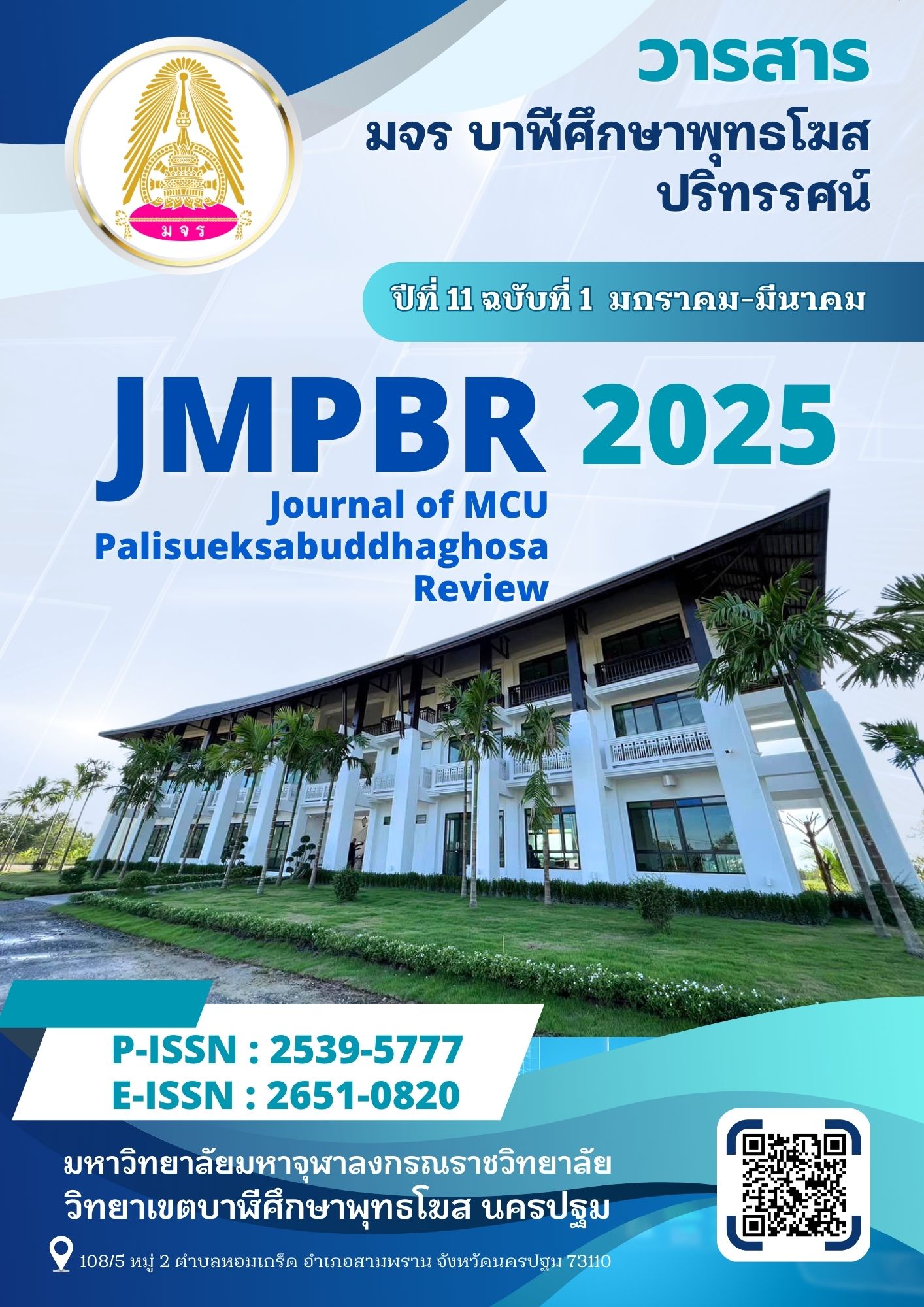ENHANCING HAPPINESS ACCORDING TO THE FOUR FOUNDATIONS OF MINDFULNESS
Main Article Content
Abstract
The findings reveal that the principles for enhancing happiness in society follow the eight dimensions of happiness: 1. Good health. 2. Kindness and generosity. 3.Relaxation. 4.Intellectual growth (Brain: seeking knowledge). 5.Morality. 6.Financial self-sufficiency (ability to manage personal income and expenses). 7. Family happiness (strong family relationships) 8. Organizational and social well-being (harmonious society). Additionally, Buddhist principles such as generosity (dāna), morality (sīla), meditation (samādhi), cultivating a mindset of giving and self-sacrifice, developing loving-kindness (brahmavihāra), and practicing public-mindedness (sādhāraṇīyadhamma) should be emphasized. These principles contribute to inner peace and true happiness. The practice of Dhamma based on the Four Foundations of Mindfulness involves cultivating mindfulness in daily life by being aware of the body (kāya), feelings (vedanā), mind (citta), and mental objects (dhamma). It begins with mindfulness of the body (kāyānupassanā), which includes awareness of bodily movements, physical sensations, and even the rising and falling of the abdomen. This is followed by mindfulness of feelings (vedanānupassanā), which involves recognizing bodily and mental sensations—pleasant, unpleasant, or neutral. Then, mindfulness of the mind (cittānupassanā) is developed, focusing on awareness of thoughts, emotions, and distinguishing between the self and the mind. The guidelines for enhancing happiness in society based on the Four Foundations of Mindfulness are as follows: 1. Focusing on physical well-being – This approach emphasizes happiness through physical aspects, such as maintaining good health and having sufficient basic necessities for living. The principle of a sufficiency economy can be applied to promote adequate and sustainable income for individuals. 2. Focusing on mental well-being – This approach emphasizes psychological happiness, including peace of mind, inner happiness, and wisdom. The Four Foundations of Mindfulness can be applied to encourage mindfulness in daily life, helping individuals let go of attachments, develop wisdom in solving problems, and appreciate the value of things around them.
Article Details

This work is licensed under a Creative Commons Attribution-NonCommercial-NoDerivatives 4.0 International License.
Copyright Notice
The content and information in the articles published in Journal of MCU Palisueksabuddhaghosa Review, are regarded as opinions and responsibilities of article author only. It definitely does not mean that the editor must agree or share any responsibility to the author.
Articles, information, content, figure etc. that have been published in the Journal of MCU Palisueksabuddhaghosa Review is considered as the copyright of the Journal. If any individual or organization will to bring any parts of article for promote or to do anything, must be licensed only in official form from the Journal of MCU Palisueksabuddhaghosa Review.
The content and information in the articles published in Journal of MCU Palisueksabuddhaghosa Review, are regarded as opinions and responsibilities of article author only. It definitely does not mean that the editor must agree or share any responsibility to the author.
Articles, information, content, figure etc. that have been published in the Journal of MCU Palisueksabuddhaghosa Review is considered as the copyright of the Journal. If any individual or organization will to bring any parts of article for promote or to do anything, must be licensed only in official form from the Journal of MCU Palisueksabuddhaghosa Review.
References
มหาวิทยาลัยมหาจุฬาลงกรณราชวิทยาลัย. พระไตรปิฏกภาษาไทย ฉบับมหาจุฬาลงกรณราชวิทยาลัย.
กรุงเทพมหานคร: โรงพิมพ์มหาจุฬาลงกรณราชวิทยาลัย, ๒๕๓๙.
พระพรหมคุณาภรณ์ (ป. อ. ปยุตโต). พจนานุกรมพุทธศาสตร์ ฉบับประมวลธรรม. พิมพ์ครั้งที่ ๒๓.
กรุงเทพมหานคร: สำนักพิพม์ผลิธัมม์,๒๕๕๕.
สวนดุสิตโพล มหาวิทยาลัยสวนดุสิต. สวนดุสิตโพลเผยผลสำรวจ ส่วนใหญ่กังวลรัฐบาลบริหารประเทศ ของแพง-ค่าครองชีพยังสูง พ.ศ.๒๕๖๒. [ออนไลน์]. แหล่งที่มา: https://www.matichon.co.th/news-monitor/news_1660954, [๒๓ มกราคม ๒๕๖๕].
สำนักงานคณะกรรมการพัฒนาการเศรษฐกิจและสังคมแห่งชาติ. “แผนพัฒนาเศรษฐกิจและสังคม แห่งชาติ ฉบับที่สิบเอ็ด พ.ศ. ๒๕๕๕-๒๕๕๙”. [ออนไลน์], แหล่งที่มา: http://www. nesdb.go.th/download/ article/article_20160323112431.pdf. [๒๖ ตุลาคม ๒๕๖๔].
สำนักงานคณะกรรมการพัฒนาการเศรษฐกิจและสังคมแห่งชาติ. “แผนพัฒนาเศรษฐกิจและสังคม แห่งชาติ ฉบับที่สิบเอ็ด พ.ศ. ๒๕๕๕-๒๕๕๙”, [ออนไลน์], แหล่งที่มา: http://www. nesdb.go.th/download/ article/article_20160323112431.pdf. [๒๖ ตุลาคม ๒๕๖๔].
พระมหาสุทิตย์ อาภากโร. สุขที่ได้ธรรม. กรุงเทพมหานคร: โรงพิมพ์ บริษัทดีไซน์ ดีไลท์ จำกัด, ๒๕๕๖.

